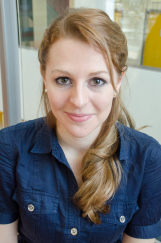Friday Talk by Jennifer Cook
Jennifer Cook is visiting Aarhus in connection to Arndis Simonsen's PhD Defence and is kindly presenting a talk on her work on social cognition
Info about event
Time
Location
IMC Meeting Room, Jens Chr. Skous Vej 4, Building 1483, 8000 Aarhus C
Organizer

After doing a PhD in Neuroscience at UCL, and postdoctoral work at both Magdalene College, Cambridge University and at Donder’s Institute in the Netherlands, Jennifer Cook has been a Birmingham Fellow at the University of Birmingham since September 2015. She has worked extensively on action and social cognition in typically developed adults and those with autism spectrum conditions, and her ongoing work uses behavioural genetics and psychopharmacology to investigate the contributions of neuromodulators such as dopamine and serotonin to individual differences in social learning.
Her current lab (jencooklab.com) works on the overlap between action, social cognition and neuromodulators in both in the typical population and in people with autism.
Abstract:
The social dominance paradox, and what it tells us about the mechanisms of social learning
Dominant individuals report high levels of self-sufficiency, self-esteem, and authoritarianism. The lay stereotype suggests that such individuals ignore information from others, preferring to make their own choices. However, the non-human animal literature presents a conflicting view, suggesting that dominant individuals are avid social learners, whereas subordinates focus on learning from private experience. In the first part of this talk I will discuss whether dominant humans are best characterised by the lay stereotype or the animal view of dominance. In the second part of this talk I turn my attention to the mechanisms that underpin social learning: Can it really be the case that a person can be good at social learning and, at the same time, poor at learning from their own private experience; and, if so, does it follow that social and private learning are underpinned by dissociable neural and psychological mechanisms?
